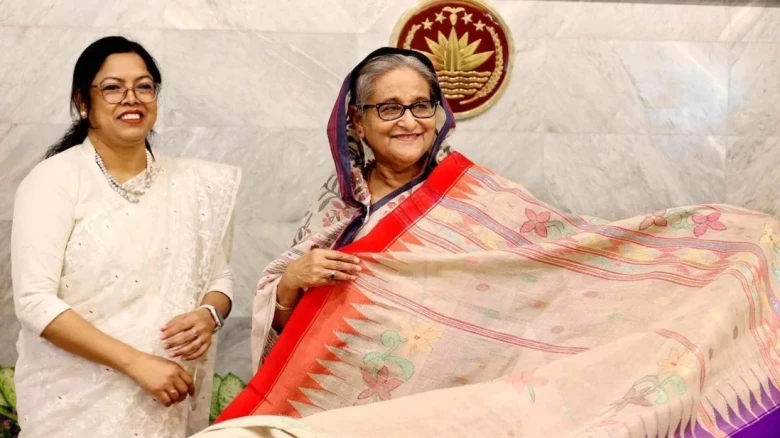Allegations of purchasing Indian saris for resale in Bangladesh added a layer of intrigue to the political discourse...
Digital Desk: Opposition leaders in Bangladesh have intensified their efforts to stoke anti-India sentiments, particularly in the wake of Sheikh Hasina's fourth consecutive electoral victory, which reinforced her close ties with India. The 'Boycott India' campaign, spearheaded by the opposition, faced a formidable challenge when Prime Minister Sheikh Hasina broke her silence to confront her rivals head-on, employing a unique weapon: the humble sari.
Hasina's association with India, both politically and personally, has been a focal point for her adversaries, who sought to portray her as "pro-India" and alleged Indian interference in the country's electoral process. The 'Boycott India' campaign gained momentum, prompting Hasina to retaliate with a strategic twist.
Embracing the iconic symbol of femininity and cultural heritage, Hasina utilized the sari as a means to dismantle the opposition's narrative. By questioning the authenticity of the opposition leaders' stance, Hasina challenged them to showcase their commitment by burning their wives' Indian saris, a bold move that resonated with her supporters and drew attention to the hypocrisy of the opposition's rhetoric.
Furthermore, Hasina's sari diplomacy extended beyond symbolism, as she accused the opposition leaders and their spouses of engaging in the very trade they condemned. Allegations of purchasing Indian saris for resale in Bangladesh added a layer of intrigue to the political discourse, further undermining the opposition's credibility.
However, Hasina's scrutiny did not stop at saris; she delved into the realm of culinary preferences, highlighting the reliance on Indian spices in Bangladeshi cuisine. By challenging the opposition leaders to forsake Indian spices and embrace a culinary alternative, Hasina exposed the intricacies of bilateral trade and cultural interdependence, emphasizing the impracticality of severing ties with India.
Hasina's sari diplomacy not only neutralized the opposition's anti-India rhetoric but also showcased her adeptness at utilizing cultural symbols to her advantage. By leveraging her affinity for the sari and her diplomatic ties with India, Hasina not only defended her government's policies but also reaffirmed the enduring bond between Bangladesh and its neighbor.
As the political landscape in Bangladesh continues to evolve, Sheikh Hasina's sari diplomacy serves as a testament to the power of cultural symbolism in shaping political discourse and reinforcing diplomatic relations. In a world marked by geopolitical tensions, her strategic maneuvering offers a lesson in statesmanship and the art of political communication.

Leave A Comment